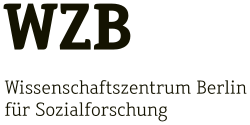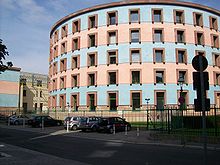WZB Berlin Social Science Center
The WZB Berlin Social Science Center (German: Wissenschaftszentrum Berlin für Sozialforschung, WZB), also known by its German initials WZB, is an internationally renowned research institute for the social sciences, the largest such institution in Europe not affiliated with a university.
 | |
Former names | International Institute of Management – Wissenschaftszentrum Berlin |
|---|---|
| Type | Public |
| Established | 1969 |
Parent institution | Leibniz Association |
| Director | Jutta Allmendinger |
| Location | , |
| Website | https://www.wzb.eu/en |

It was founded in 1969 through an all-party initiative of the German Bundestag.[1] Around 140 German and foreign sociologists, political scientists, economists, historians, statisticians, computer scientists and legal scholars work in the WZB conducting basic research on selected social and political issues, concentrating on the industrialized societies of Japan and the West, as well as the transformations of Central and Eastern Europe and China. The question of globalization is of particular importance.[2]
Research areas
editThe WZB is organized into seven research areas:
- Dynamics of Social Inequalities
- Markets and Choice
- Digitalization and Societal Transformation
- International Politics and Law
- Dynamics of Political Systems
- Migration and Diversity
- Political Economy of Development
Constituted as a non-profit limited liability company (GmbH), ownership is shared between the federal government (75 percent) and the city-state of Berlin (25 percent).[1] WZB is a member of the Gottfried Wilhelm Leibniz Scientific Community.
Although not a university body, it collaborates with Free University of Berlin, Hertie School of Governance, Humboldt University, Technische Universität Berlin, Berlin University of the Arts, as well as with research institutions in Berlin and abroad. Many WZB scientists are also university professors or hold teaching assignments.
Recent presidents of the WZB have included Meinolf Dierkes (1980–1987), Wolfgang Zapf (1987–1994), Friedhelm Neidhardt (1994–2000), and historian Jürgen Kocka (2001–2007).[3] The current president is sociologist Jutta Allmendinger.[4]
WZB is said to be the largest such research institution for the social sciences in Europe.[citation needed] Around 140 social scientists are conducting research on the developmental trends, problems of adaptation, and possibilities for innovation in modern societies.
The Federal Republic of Germany and the federal state of Berlin have been shareholders and main funders since 1976.
WZB headquarters on Landwehrkanal in Berlin-Tiergarten was designed 1979–1988 by the British architects James Stirling and Michael Wilford integrating the 1894 building of Reichsversicherungsamt.
A.SK Social Science Award and Fellowships
editSince 2007 the WZB grants the A.SK Award and Fellowships biannually:[5] "The 100,000 Euro A.SK Social Science Award is one of the best-endowed awards in the social sciences. The endowment capital has been donated by the Chinese entrepreneurs Angela and Shu Kai Chan. The award recognizes outstanding contributions to social and political reform."[6] In German media award and fellowships were compared with internationally recognized prizes, such as the Johan Skytte Prize and the Balzan Prize.[7] In 2007 all laureates for the Award and Award Fellowships were nominated and chosen by a selection committee consisting of: Prof. Jutta Allmendinger, Prof. Werner Abelshauser, Prof. Stefano Bartolini, Prof. Lord Dahrendorf Prof. Peter Katzenstein and Prof. Kai A. Konrad. Since 2009 the WZB also publishes Calls for Nominations for the A.SK Fellowship.[8] In 2015 the selection committee includes: Prof. Jutta Allmendinger, Prof. Werner Abelshauser, Prof. Kurt Biedenkopf, Prof. Dorothea Kübler, Prof. Orlando Patterson and Prof. Shalini Randeria.[9] The A.SK Award and Fellowships are handed over in a public ceremony, honoring the laureates and including leading politicians or scholars as speakers, in Berlin. In 2009 the ceremony was part of the celebration of the 40th anniversary of the WZB with the German president Horst Köhler as one of the speakers.[10]
2019
2017
John Ruggie (Award)
Philipp Hacker
Alexander Horn
2015
Esther Duflo (Award)
Robert Lepenies
Juliana Silva Goncalves
Mahnaz Zahirinejad Varnosfaderani
2013
Paul Collier (Award)
Daniel Tischer
Olga Ulybina
Josef Hien
Theresa Reinold
2011:
Transparency International (Award)
Yaman Kouli
Thamy Pogrebinschi
Martin Schröder
2009
Martha C. Nussbaum (Award)
Arolda Elbasani
Alexander Petring
Juan Fernandez
2007
Sir Anthony Atkinson (Award)
Andreas Leutzsch
Felix Kolb
Janine Leschke
People affiliated with WZB
editSee also
editNotes
edit- ^ a b "Brief Timeline of the WZB", accessed 2008-07-02
- ^ "Positioning WZB Research in the Scientific Landscape", accessed 2008-07-02
- ^ Former Presidents, accessed 2008-07-02
- ^ Prof. Jutta Allmendinger, curriculum vitae, accessed 2008-07-02
- ^ a b "A.SK Social Science Award | WZB". www.wzb.eu. Retrieved 25 August 2015.
- ^ "bsg. oxford". 18 October 2013.
- ^ "Das chinesische Geschenk - Wissen - Tagesspiegel". Der Tagesspiegel Online. 15 November 2007. Retrieved 25 August 2015.
- ^ "H-Net Discussion Networks - Stip: A.SK Post-Doc-Fellowships (WZB Berlin)". h-net.msu.edu. Retrieved 25 August 2015.
- ^ "A.SK Selection Committee | WZB". www.wzb.eu. Retrieved 25 August 2015.
- ^ "www.bundespraesident.de: Der Bundespräsident / Reden / Grußwort von Bundespräsident Horst Köhler beim Festakt zum 40jährigen Bestehen des Wissenschaftszentrums Berlin für Sozialforschung". www.bundespraesident.de. Retrieved 25 August 2015.
External links
edit- WZB website (in German)
- WZB website (in English)
- "Think Tank Directory" Profile of the WZB (in German)